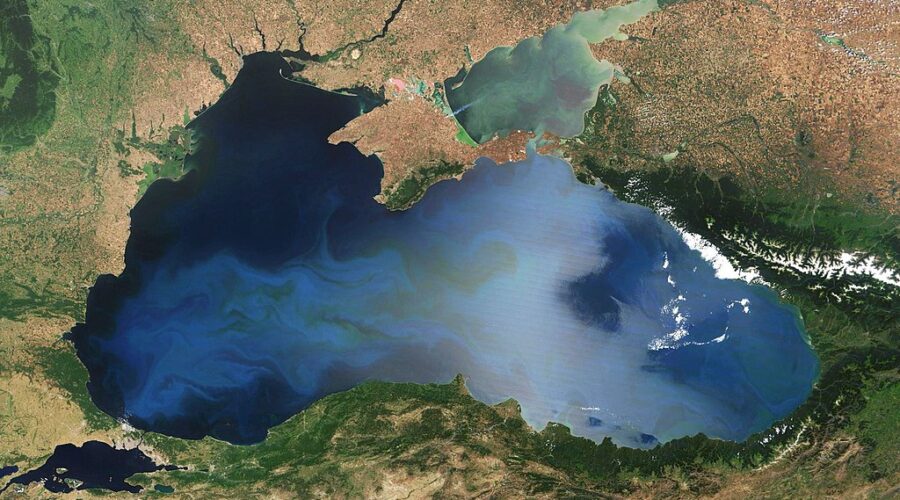On April 14, 2022, following the Ukrainian sinking of the Russian Moskva flagship missile cruiser, it became obvious that Russia’s dominance in the Black Sea region has come to an end. Two and a half months later, the Kremlin’s decision to withdraw Russian troops from the strategically important Snake Island has allowed Ukraine to get the initiative in the Black Sea.
The Eastern European nation is now in a position to openly threaten to destroy Russia’s Black Sea ports of Anapa, Novorossiysk, Gelendzhik, Tuapse, Sochi, and Taman. Kyiv has clearly demonstrated that, unlike the Kremlin, it is not bluffing. On August 4, as a result of the Ukrainian sea drone attack, a Russian warship in the Black Sea suffered serious damage. Only one day later, Ukrainian drones hit a Russian tanker in the Kerch Strait. Previously, on July 20, Ukraine said that any ships heading to Russian ports may be military targets, which was Kyiv’s response to Moscow’s threat that ships traveling to Ukraine’s Black Sea ports will be seen as possibly carrying military cargoes.
But unlike Moscow, which to this day has not sunk any ships heading to Ukrainian ports, Kyiv proved that it has capacity to seriously damage both Russian civilian and military ships. The Kremlin, for its part, has launched several missile and drone attacks on Ukrainian port infrastructure in Mykolaiv, Odesa and Izmail.
Although some Ukraine’s grain silos have been damaged, it is improbable that Russia aimed to completely destroy the Eastern European country’s ports.
Instead, the Kremlin likely used its attacks on Ukrainian port infrastructure as a bargaining chip, aiming to force both Kyiv and Turkey to renew the grain deal under Moscow’s conditions. On July 17, Russia suspended its participation in the Black Sea Grain Initiative (also known as the grain deal) – a document signed by Russian, Turkish, Ukrainian and UN representatives in July 2022 – that let Ukraine ship its grain through its ports on the Black Sea. Russian officials repeatedly stated that Moscow would “immediately” return to the deal if its conditions are met. Those conditions included: readmission of the Russian Agricultural Bank (Rosselkhozbank) to the SWIFT payment system, resumption of exports of agricultural machinery and spare parts to Russia, removal of restrictions on insurance and access to ports for Russian ships and cargo, reinstatement of a now-damaged ammonia export pipeline from Russia’s Togliatti to Odesa in Ukraine, as well as the unblocking of accounts and financial activities of Russian fertilizer companies.
Western-backed Ukraine is unlikely to ever fulfil all of the Kremlin’s conditions, since such a move would represent a de facto capitulation to Russian President Vladimir Putin. Quite aware of that, Russia’s policy makers would almost certainly return to the grain deal if Kyiv accept at least some of Moscow’s demands. Thus, Russian missile strikes on Ukrainian ports represented a method of pressure on the Eastern European country, as well as another Putin PR stunt. It is not the first time that the Kremlin has used such a strategy vis-à-vis Ukraine.

Following Ukraine’s attack on the Crimean Bride in October 2022, Russia launched a barrage of missile strikes on Ukrainian energy infrastructure. Although large parts of Ukraine faced blackouts throughout the fall and winter of 2022, the nation’s power plants survived Russian attacks.
As a result, by the spring of 2023, Ukraine managed to stabilize its energy system, and even resume electricity exports to Europe. In other words, the Kremlin is unlikely to have ever aimed to completely destroy the Ukrainian energy system, but rather to convince the Russian population that Moscow is determined to “seriously respond” to Kyiv’s attack on the Crimean Bridge.
It is entirely possible that the Kremlin has decided to implement the same approach when it comes to the Ukrainian port infrastructure, which means that Moscow does not seek to level it to the ground, but to send a political message to Kyiv, as well as to the Russian audience.
Meanwhile, Putin is expected to negotiate a potential new grain deal with his “dear friend”, Turkish President Recep Tayyip Erdogan, while Ukraine will undoubtedly continue to strike Russian ships in the Black Sea.
⚡️”Russia will be left without ships until the end of the war if it continues to attack Ukrainian ports,” Volodymyr #Zelensky said in an interview with La Nacion. pic.twitter.com/bFxNPkwYhj
— KyivPost (@KyivPost) August 7, 2023
“Russia will be left without ships by the end of the war if it continues to attack Ukrainian ports”, Ukrainian President Volodymyr Zelensky said.
The ball is now in the Kremlin’s court. If Russia stops striking Ukrainian ports and allows Kyiv to freely export its grains, it will demonstrate serious weakness. If it continues launching missile and drone attacks on the Eastern European nation’s grain silos in Odesa, Mykolaiv, and Izmail, it will face more humiliation in the Black Sea region. Indeed, Putin has a very hard choice to make.
But regardless of his decision, one thing is for sure: the Black Sea is no longer a “Russian lake”. In the coming months, Russia may have a hard time protecting its Black Sea Fleet.
Images: Orhan Erkılıç and anttilipponen

